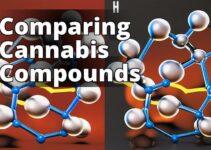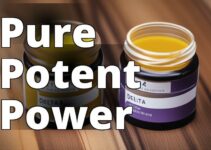In recent years, the use of cannabidiol (CBD) for seizures has gained significant attention due to its potential benefits and fewer side effects. A non-psychoactive compound found in cannabis plants, CBD has shown promise in treating various medical conditions, including epilepsy. This article will explore how CBD works for seizure treatment and discuss some of the available prescription medications like Epidiolex.
The Science Behind CBD and Seizures
Seizures are caused by sudden, uncontrolled electrical activity in the brain. The exact mechanism through which CBD helps control seizures is still not completely understood. However, researchers believe that it may be related to the interaction between CBD and the endocannabinoid system (ECS). The ECS plays a crucial role in regulating various functions, such as mood, sleep, appetite, and immune system response.
CBD can interact with the ECS receptors, particularly the CB1 and CB2 receptors, helping to modulate and stabilize the overactive neural signals responsible for seizures. It also has anti-inflammatory and antioxidant properties, which may contribute to reducing neuronal excitability and inflammation associated with epilepsy.
Available Research on CBD and Seizures
Several studies have investigated the efficacy of CBD in reducing seizure frequency and severity. One of the most well-known clinical trials was conducted on patients with Dravet syndrome, a severe form of childhood epilepsy. The results demonstrated that CBD significantly reduced seizure frequency compared to a placebo group. In another study involving patients with Lennox-Gastaut syndrome, another severe form of epilepsy, CBD showed similar promising results.
These and other research findings have led to the development and approval of Epidiolex, a prescription CBD medication for the treatment of seizures in patients with Dravet syndrome and Lennox-Gastaut syndrome.
Epidiolex: A Prescription CBD Medication
Epidiolex is the first FDA-approved prescription medication containing CBD derived from cannabis plants. It has undergone rigorous testing and clinical trials to ensure its safety and efficacy in treating seizures associated with Dravet syndrome and Lennox-Gastaut syndrome in patients two years of age and older.
How Is Epidiolex Administered?
Epidiolex is an oral solution that is typically prescribed based on the patient's body weight. The initial dosage starts low and can be gradually increased over time under the guidance of a healthcare provider. It is essential to closely follow the prescribed dosage and administration guidelines to ensure optimal results and minimize potential side effects.
Potential Side Effects of Epidiolex
As with any medication, there are potential side effects associated with Epidiolex. Some common side effects include drowsiness, decreased appetite, diarrhea, fever, fatigue, and vomiting. While most side effects are mild and manageable, it is crucial to notify your healthcare provider if you experience any severe or persistent symptoms.
It is also important to note that Epidiolex may interact with other medications, such as certain antiepileptic drugs, leading to increased side effects or reduced effectiveness. Therefore, always inform your healthcare provider about any other medications or supplements you are taking before starting Epidiolex therapy.
Other CBD Products for Seizures
Although Epidiolex is currently the only FDA-approved prescription CBD medication for seizures, various other CBD products are available on the market, ranging from oils and capsules to edibles and topical creams.
Choosing the Right CBD Product for Seizures
If you are considering using CBD for seizure management, it is crucial to choose a high-quality product that meets your specific needs. Here are some factors to consider when selecting a suitable CBD product:
- Purity and Potency: Opt for products that have been third-party tested to ensure they contain the specified amount of CBD and are free from harmful contaminants, such as pesticides or heavy metals.
- Source of CBD: Choose products derived from organically grown hemp plants to minimize exposure to potentially harmful chemicals.
- Type of CBD: Full-spectrum CBD products contain all the naturally occurring compounds in the cannabis plant, including trace amounts of THC. Broad-spectrum and isolate CBD products are typically THC-free, making them more suitable for those who want to avoid any psychoactive effects or potential drug tests.
- Formulation: Consider the desired method of administration (e.g., oral, sublingual, topical) and select a product specifically designed for that purpose.
Before starting any new treatment plan, it is vital to consult with a healthcare professional to ensure the safety and appropriateness of CBD therapy for your specific situation. They can help determine the right dosage, monitor progress, and manage any potential interactions with other medications.
CBD and Seizure Management: A Promising Alternative
The increasing body of research on CBD's effectiveness in reducing seizure frequency and severity has opened up new possibilities for patients struggling with epilepsy. With the availability of prescription medications like Epidiolex and various other CBD products, many individuals may find relief and improved quality of life through this non-psychoactive, natural compound. However, it is essential to work closely with a healthcare professional to ensure the safest and most effective approach to seizure management using CBD.




